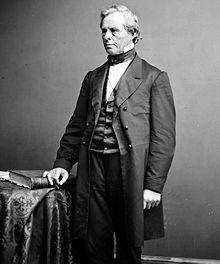William Gay Brown Sr.
William Gay Brown senior (born September 25, 1800 in Kingwood , Virginia , † April 19, 1884 ibid) was an American politician . Between 1845 and 1849 and between 1861 and 1863 he represented the state of Virginia and from 1863 to 1865 the state of West Virginia in the US House of Representatives .
Career
William Brown was born in 1800 in Kingwood, which was then still part of Virginia, but has been part of West Virginia since 1863. He attended the public schools in his home country. After a subsequent law degree and his admission as a lawyer in 1823, he began to practice in Kingwood in his new profession. Politically, he became a member of the Democratic Party .
In 1832 and between 1840 and 1843 he was a member of the Virginia House of Representatives . In the congressional election of 1844 he was elected to the US House of Representatives in Washington, DC in the 15th District of Virginia , where he succeeded Lewis Steenrod on March 4, 1845 . After re-election in 1846, he was able to complete two terms in Congress until March 3, 1849 , which were determined by the events of the Mexican-American War . During this time, as a result of the war, large areas in the southwest of what is now the United States came under American sovereignty, including the current states of California , Texas , Arizona and New Mexico . In addition, the north-western border with Canada was set at the 49th parallel.
In 1850 and 1861, Brown was a delegate at meetings to revise the Virginia constitution. In 1860 he was a delegate to two Democratic National Convention , which in Charleston ( South Carolina ) and Baltimore ( Maryland took place). In the 1860s, Brown played an important role in establishing the new state of West Virginia. In the discussion about Virginia's departure from the Union, Brown, like most of his compatriots from the northwest of the state, was in favor of staying with the Union. For this attitude he was re-elected to Congress as a unionist in 1860 for what was then the tenth district of Virginia. There he followed Sherrard Clemens on March 4, 1861 . He held his mandate until March 3, 1863, because he represented a district in what would later be West Virginia - an area that had not withdrawn from the Union. At the meeting that decided Virginia's exit from the Union, Brown spoke out unsuccessfully against these plans. After this step, the northwest of the state declared independence from Virginia.
After West Virginia was founded, William Brown was re-elected as a member of Congress in the new state's second constituency. He exercised this mandate between December 7, 1863 and March 3, 1865. This period was overshadowed by the events of the civil war. In 1864 he renounced another candidacy. After his tenure in Congress ended, Brown retired from politics and returned to work as a lawyer. His son William Jr. (1856-1916) also represented West Virginia in Congress from 1911 to 1916.
Web links
- William Gay Brown in the Biographical Directory of the United States Congress (English)
- William G. Brown in the database of Find a Grave (English)
| personal data | |
|---|---|
| SURNAME | Brown, William Gay Sr. |
| BRIEF DESCRIPTION | American politician |
| DATE OF BIRTH | September 25, 1800 |
| PLACE OF BIRTH | Kingwood , Virginia |
| DATE OF DEATH | April 19, 1884 |
| Place of death | Kingwood , West Virginia |


